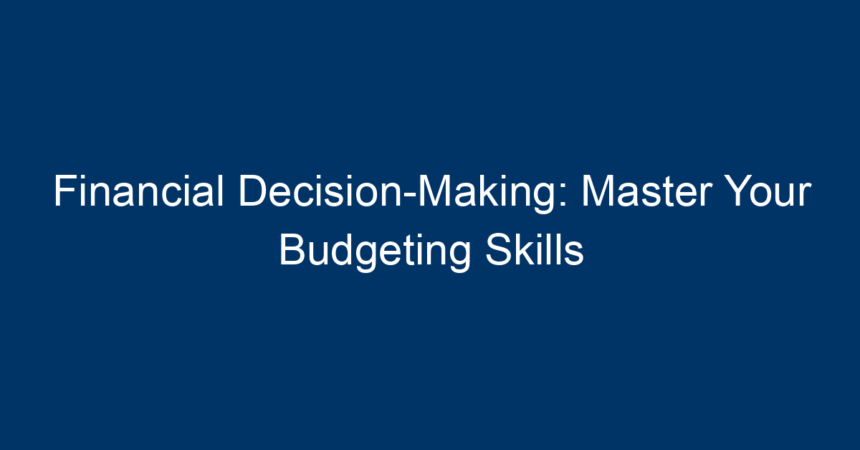In today’s fast-paced world, effective financial decision-making is more critical than ever. Understanding how to manage your money can mean the difference between stress and financial security. This article aims to equip you with essential budgeting skills, paving the way to smarter financial decision-making. Whether you’re just starting or looking to refine your existing skills, mastering budgeting can unlock opportunities and enhance your quality of life.
The Importance of Financial Decision-Making
Financial decision-making involves choosing how to allocate your resources to achieve your life goals. This encompasses budgeting, saving, and investing wisely. Here’s why it’s crucial:
1. Achieving Financial Goals
Every individual has unique financial aspirations, whether it’s buying a home, saving for retirement, or traveling the world. Strong financial decision-making helps you identify these goals and build actionable strategies to reach them.
2. Reducing Financial Stress
Poor financial habits can lead to stress and anxiety. By mastering budgeting skills, you can create a plan that minimizes debt and helps maintain a comfortable cash flow, ultimately leading to peace of mind.
3. Building Wealth
Effective budgeting is the cornerstone of wealth-building. It allows you to track your expenses, identify savings, and invest wisely, ensuring that your money works for you.
Understanding the Basics of Budgeting
To master your budgeting skills, it’s essential to grasp the basics of budgeting.
What Is a Budget?
A budget is a financial plan that outlines your income and expenses over a specific period. It helps you manage your spending and tracks whether you are living within your means.
The Components of a Budget
- Income: This includes all sources of income, such as salaries, side hustles, and passive income streams.
- Fixed Expenses: Costs that remain constant each month, like rent or mortgage payments, car loans, and insurance.
- Variable Expenses: These are costs that fluctuate, such as groceries, entertainment, and dining out.
- Savings and Investments: Set aside a portion of your income for savings accounts, retirement funds, or other investment opportunities.
Creating Your Budget: Step-by-Step
Creating a budget involves several key steps. Follow this process to enhance your financial decision-making skills:
Step 1: Gather Your Financial Information
Begin by collecting all your financial documents, including bank statements, pay stubs, and bills. This will give you a clear picture of your current financial situation.
Step 2: Calculate Your Total Income
Add up all sources of income — this is the foundation of your budget. Be sure to consider any irregular income sources, such as bonuses or side jobs.
Step 3: List Your Expenses
Document all your monthly expenses. This step is crucial for understanding where your money is going. Categorize them into fixed and variable for better clarity.
Step 4: Compare Income to Expenses
Subtract your total expenses from your total income. If you have a surplus, you can allocate funds towards savings or investments. If you’re in the red, it’s time to reassess your spending.
Step 5: Adjust Accordingly
Identify areas where you can cut back on variable expenses. Look for subscriptions you don’t use, dining out less often, or finding cheaper alternatives for your fixed expenses.
Step 6: Implement and Monitor
Once your budget is created, implement it. Track your spending regularly to ensure you stay on course. Adjust as necessary to adapt to life changes or unexpected expenses.
Tools to Enhance Your Budgeting Skills
Modern technology offers various tools to aid in financial decision-making and budgeting.
1. Budgeting Apps
Consider using budgeting apps like Mint, You Need a Budget (YNAB), or EveryDollar. These tools help you monitor expenses in real-time, making it easier to stay within budget.
2. Spreadsheet Software
For those who prefer a more hands-on approach, using spreadsheet software like Microsoft Excel or Google Sheets can help you create a custom budget. Templates are available online to simplify this process.
3. Financial Advisors
If you’ll raise significant financial decisions, consulting a financial advisor can bring professional insights into your budgeting and investment strategies.
The Role of Emotional Intelligence in Financial Decision-Making
While technical skills are essential, emotional intelligence also plays a vital role in financial decision-making.
Understanding Your Spending Triggers
Be aware of emotional triggers that lead you to spend impulsively. This could be stress, boredom, or social influences. Recognizing these triggers can help you make more rational financial decisions.
Developing Delayed Gratification
Cultivating patience and the ability to wait for larger rewards can enhance your financial decision-making. This skill can prevent impulsive buys and help you focus on long-term goals.
Conclusion: Actionable Insights for Mastering Your Budgeting Skills
Mastering financial decision-making through effective budgeting skills is a journey, not a destination. Here are actionable insights to implement today:
- Assess Your Current Finances: Take time to evaluate your income and expenses.
- Set Clear Financial Goals: Define short-term and long-term goals to guide your budgeting.
- Be Flexible: Life changes, and so can your budget. Be prepared to adjust as needed.
- Regularly Review Your Budget: Monthly check-ins to analyze your spending can keep you accountable.
- Educate Yourself: Continuous learning about personal finance can enhance your skills and confidence.
With these strategies in place, you’re well on your way to mastering financial decision-making and taking control of your financial future. Every small step you take today can lead to substantial rewards tomorrow. Embrace the journey, and let your budgeting skills pave the path to financial freedom!



